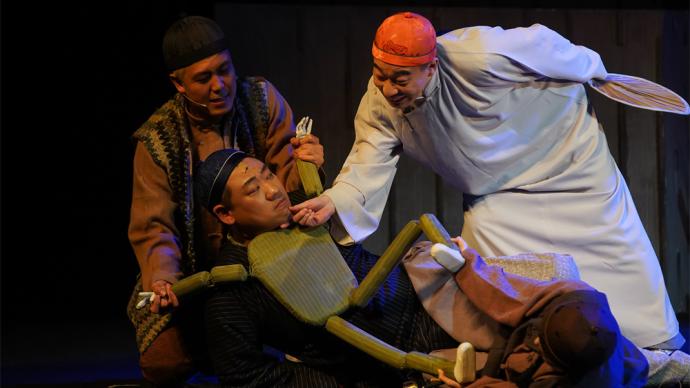
At 19:30 on June 15th, the opening bell rang at the Beijing National Centre for the Performing Arts, and the original drama "Fu Shou Quan" began. A warm light lit up, and two actors wearing slanted cloths pushed open a wooden door and stood on the stage. "Fu, Shou and Quan are three very auspicious words, which represent almost all people's expectations for life. Zhang Changfu and Li Yanshou (two cross talk actors in the play), come to the stage and bow!" When the first line was upright and high-spirited As it is told, a story begins. 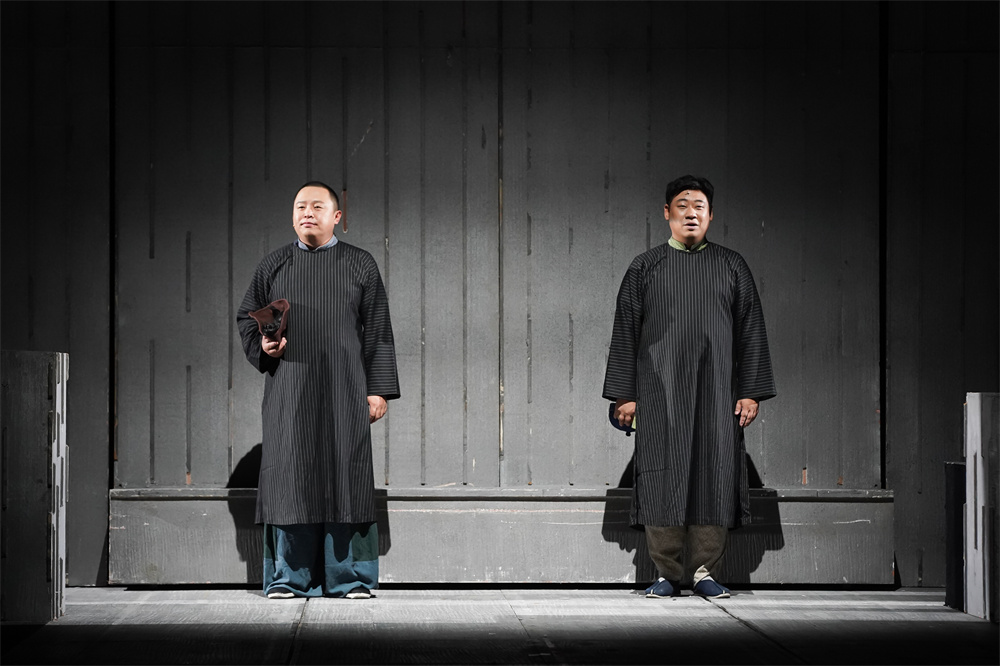
Huang Ying, the screenwriter and director of the drama "Fu Shou Quan", is a representative of the new school "Beijing-style children's drama". In recent years, there has been an endless stream of literary and artistic works that take the changes of the ages as the longitude and social development as the weft. The play interprets a legend of the cross talk gate, from 1901 to 1981, for 80 years, and Huang Ying's previous work "Dinner! , which is similar in this respect.
Speaking of drama + comic dialogue, the two art forms have an intersection. For example, they both use assumptions to quickly bring the audience into the plot situation. But how to integrate? It still takes considerable effort and effort, but the drama "Fu Shou Quan" has made a useful attempt to fill this gap. The surging journalists watched the final performance of the play on the evening of the 17th, and did a brief interview with director Huang Ying.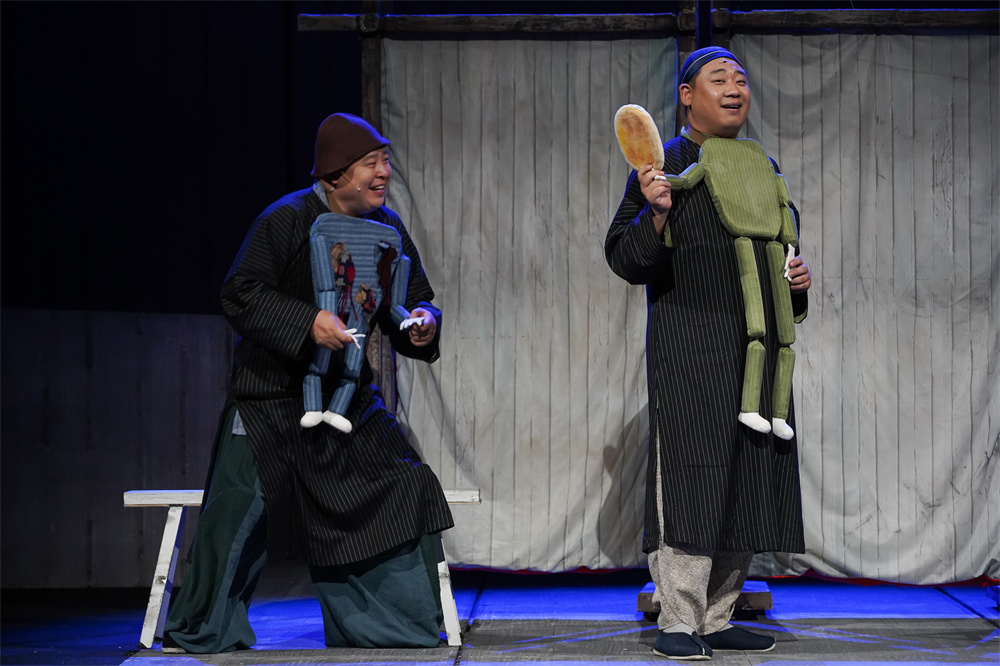
The text creation of "Fu Shou Quan" began eight years ago, and began to be staged in early 2021. It premiered in May of that year, and received unanimous attention and praise from colleagues in the theater, cross talk and audiences. Director and screenwriter Huang Ying told The Paper that she wrote this story of joy and sorrow with the concept of "laughing while living", and built a space-time structure spanning more than 80 years of life on the stage.
The stage design of the entire drama takes wood material as the main body, and draws on the pattern of "going out and coming in" in traditional opera. In addition to the two leading actors, the other four actors, two men and two women, played a total of more than 20 related roles. They make extensive use of hypothetical and game-like rehearsal methods to lightly bring the audience into a history and life that we don't fully know. In some passages that seem absurd, cunning or cruel and unbearable, we can get a glimpse of the living conditions, ways of survival and flexible optimism of people in the background of the times.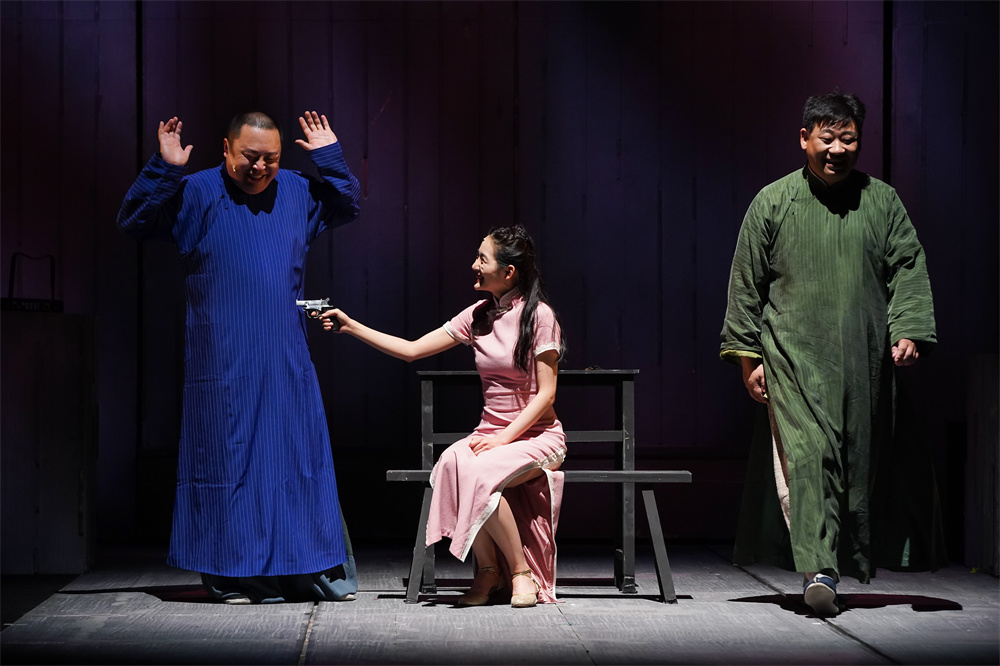
"The existence of means should always serve the spirit of expression. There are several times in the play where the two leading actors lie flat on the stage, and the camera looks down on them from above the stage, and the audience can clearly watch them on the projection screen in the background. To the faces of two people. This 'enlargement' means a kind of gaze, which is the gaze of the audience on the actor, and also the gaze of fate on all living beings." Huang Ying said. In his opinion, what kind of person do you want to be? How to keep the things that each considers the most precious in the ups and downs of the world, and then find the value of life? And what is the "happiness" of living? ——Huang Ying hopes that after the end of the original drama "Fu Shou Quan", the audience can be inspired to think about other issues besides laughter.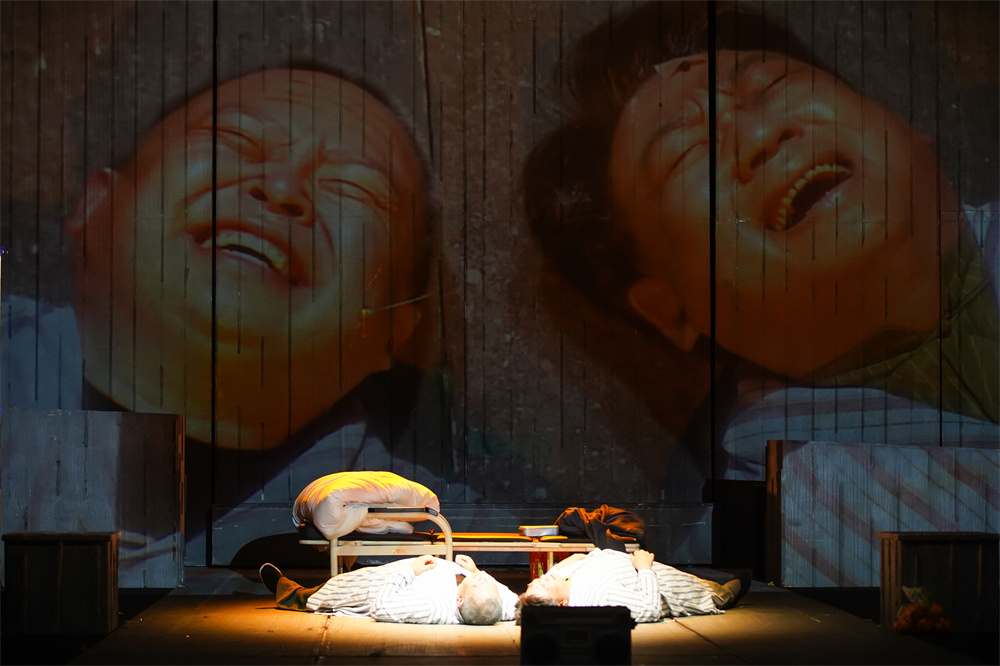
"Today, I'm going to start a drama called "Fu Shou Quan", which tells the story of two children from learning cross talk until their old age and death. A story about the original intention and the destination, there are joys and sorrows. "The first episode of "Fu Shou Quan" a year ago Before the performance, the main actor Yan Hexiang once wrote such a paragraph on his Weibo.
Seven years ago, Huang Ying started to have a heart-to-heart and started to create an original drama with "cross talk" and "cross talk actors" as the main body. Today, the play has finally undergone ups and downs and revisions, and it has been revised several times to meet the audience. Yan Hexiang plays the role of Huang Ying. Ying's fans and close friends have been waiting by the side. The play is now on, and both of them are calm and serious.
Yan Hexiang first felt fortunate that in the first drama in his life, the professional identity of the character to be played and portrayed happened to be exactly the same as himself in reality - a cross talk actor. During the nearly four months of script reading and rehearsal, he carefully traced back the historical roots of practitioners in this profession, and rationally thought about the self-selection of how to view the present and how to move towards the future.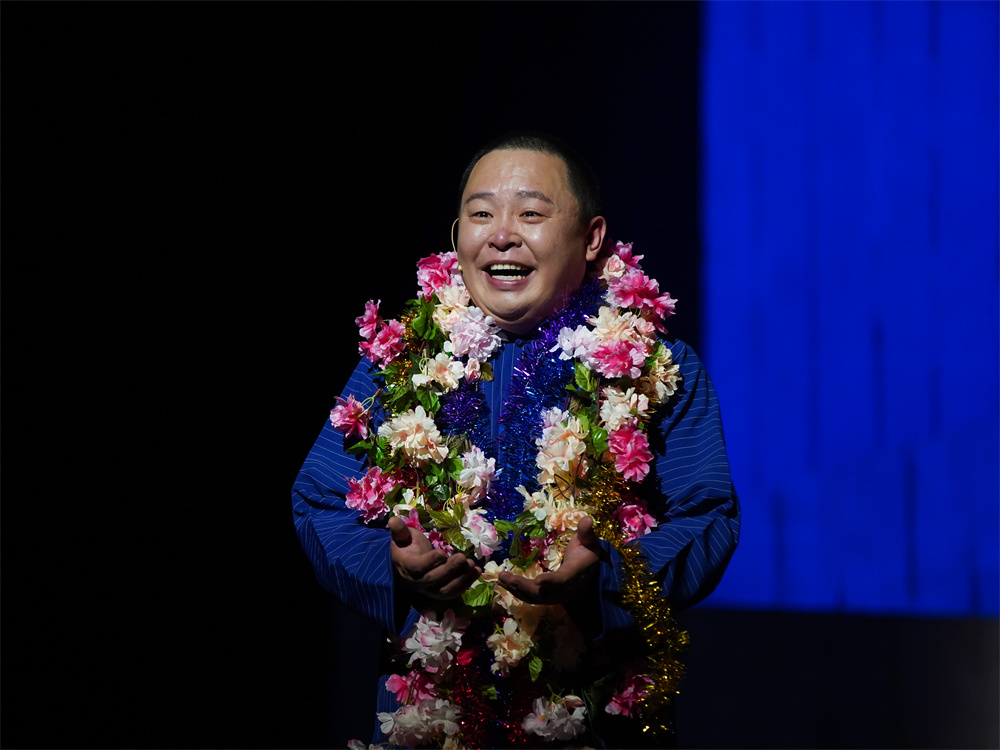
"Fu Shou Quan" is a 2020 funding project of the Beijing Culture and Art Fund, and at the same time, it has received attention and attention from people from all walks of life as a cultural and artistic creation support project in Xicheng District, Beijing. The performance of "Fu Shou Quan" was also selected for the 7th China Original Drama Invitational Exhibition jointly sponsored by the National Theatre of China and the People's Government of Xicheng District, Beijing, and funded by the China Welfare Lottery, the China Sports Lottery, and the National Arts Fund.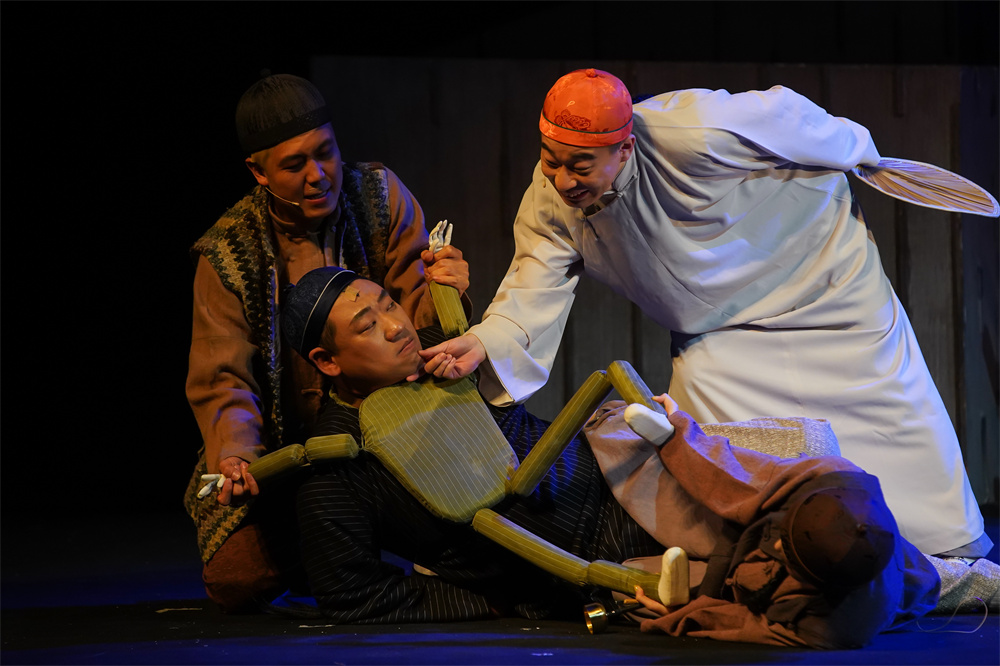

"Fu Shou Quan" stills, Yan Hexiang plays Zhang Changfu (left), Wang Jitao plays Li Yanshou. The pictures in this article were taken by Noble.
The three words "Fu Shou Quan" are put together to represent a traditional cross talk, which includes Dafan and Bai Shi, and also requires the actors to "crying Dad" on stage. As a piece of traditional cross talk, it originated from the live performance of the old man of cross talk, Enxu, and was later adapted into a language-like paragraph by Zhang Shouchen, with ideological content and character plots.Huang Ying, the screenwriter and director of the drama "Fu Shou Quan", is a representative of the new school "Beijing-style children's drama". In recent years, there has been an endless stream of literary and artistic works that take the changes of the ages as the longitude and social development as the weft. The play interprets a legend of the cross talk gate, from 1901 to 1981, for 80 years, and Huang Ying's previous work "Dinner! , which is similar in this respect.
Speaking of drama + comic dialogue, the two art forms have an intersection. For example, they both use assumptions to quickly bring the audience into the plot situation. But how to integrate? It still takes considerable effort and effort, but the drama "Fu Shou Quan" has made a useful attempt to fill this gap. The surging journalists watched the final performance of the play on the evening of the 17th, and did a brief interview with director Huang Ying.

"Fu Shou Quan" stills
"The audience's gaze on the actors is also the gaze of fate on all living beings"The text creation of "Fu Shou Quan" began eight years ago, and began to be staged in early 2021. It premiered in May of that year, and received unanimous attention and praise from colleagues in the theater, cross talk and audiences. Director and screenwriter Huang Ying told The Paper that she wrote this story of joy and sorrow with the concept of "laughing while living", and built a space-time structure spanning more than 80 years of life on the stage.
The stage design of the entire drama takes wood material as the main body, and draws on the pattern of "going out and coming in" in traditional opera. In addition to the two leading actors, the other four actors, two men and two women, played a total of more than 20 related roles. They make extensive use of hypothetical and game-like rehearsal methods to lightly bring the audience into a history and life that we don't fully know. In some passages that seem absurd, cunning or cruel and unbearable, we can get a glimpse of the living conditions, ways of survival and flexible optimism of people in the background of the times.

"Fu Shou Quan" stills
This expression technique has been tried several times by Huang Ying since the original drama "To Be Continued", and has been loved by the audience for many years. This time, he applied this way of escaping freedom in the original drama "Fu Shou Quan", which changed a special taste."The existence of means should always serve the spirit of expression. There are several times in the play where the two leading actors lie flat on the stage, and the camera looks down on them from above the stage, and the audience can clearly watch them on the projection screen in the background. To the faces of two people. This 'enlargement' means a kind of gaze, which is the gaze of the audience on the actor, and also the gaze of fate on all living beings." Huang Ying said. In his opinion, what kind of person do you want to be? How to keep the things that each considers the most precious in the ups and downs of the world, and then find the value of life? And what is the "happiness" of living? ——Huang Ying hopes that after the end of the original drama "Fu Shou Quan", the audience can be inspired to think about other issues besides laughter.

The camera shot the duo from above the stage and projected them on the stage background in real time.
Cross talk actors "play" cross talk actors, "not mechanically repeating the same state""Today, I'm going to start a drama called "Fu Shou Quan", which tells the story of two children from learning cross talk until their old age and death. A story about the original intention and the destination, there are joys and sorrows. "The first episode of "Fu Shou Quan" a year ago Before the performance, the main actor Yan Hexiang once wrote such a paragraph on his Weibo.
Seven years ago, Huang Ying started to have a heart-to-heart and started to create an original drama with "cross talk" and "cross talk actors" as the main body. Today, the play has finally undergone ups and downs and revisions, and it has been revised several times to meet the audience. Yan Hexiang plays the role of Huang Ying. Ying's fans and close friends have been waiting by the side. The play is now on, and both of them are calm and serious.
Yan Hexiang first felt fortunate that in the first drama in his life, the professional identity of the character to be played and portrayed happened to be exactly the same as himself in reality - a cross talk actor. During the nearly four months of script reading and rehearsal, he carefully traced back the historical roots of practitioners in this profession, and rationally thought about the self-selection of how to view the present and how to move towards the future.

Yan Hexiang as Zhang Changfu
Being able to have the opportunity to present the whole life of a cross talk actor on a drama stage, from birth to death, and rebuilding everything the next day, makes Yan Hexiang full of expectations for the next performance. He even gave himself a small task, that is, in every performance, not to repeat the same state mechanically - especially in the last scene - he imagined various things for the rest of his life, Zhang Changfu, the character he played. Different life situations and trends serve as the support for their own performances. This is what he thinks, the most fundamental and necessary homework and cultivation of an actor, and also Yan Hexiang's concern for "original intention" and "homecoming" in the original drama "Fu Shou Quan"."Fu Shou Quan" is a 2020 funding project of the Beijing Culture and Art Fund, and at the same time, it has received attention and attention from people from all walks of life as a cultural and artistic creation support project in Xicheng District, Beijing. The performance of "Fu Shou Quan" was also selected for the 7th China Original Drama Invitational Exhibition jointly sponsored by the National Theatre of China and the People's Government of Xicheng District, Beijing, and funded by the China Welfare Lottery, the China Sports Lottery, and the National Arts Fund.

"Fu Shou Quan" stills
Related Posts